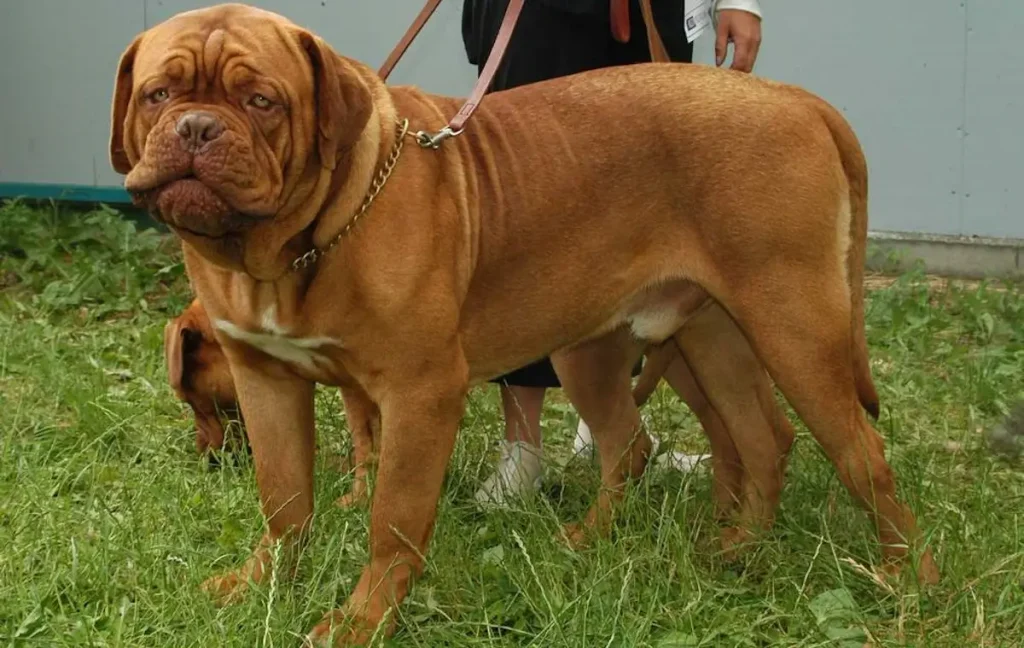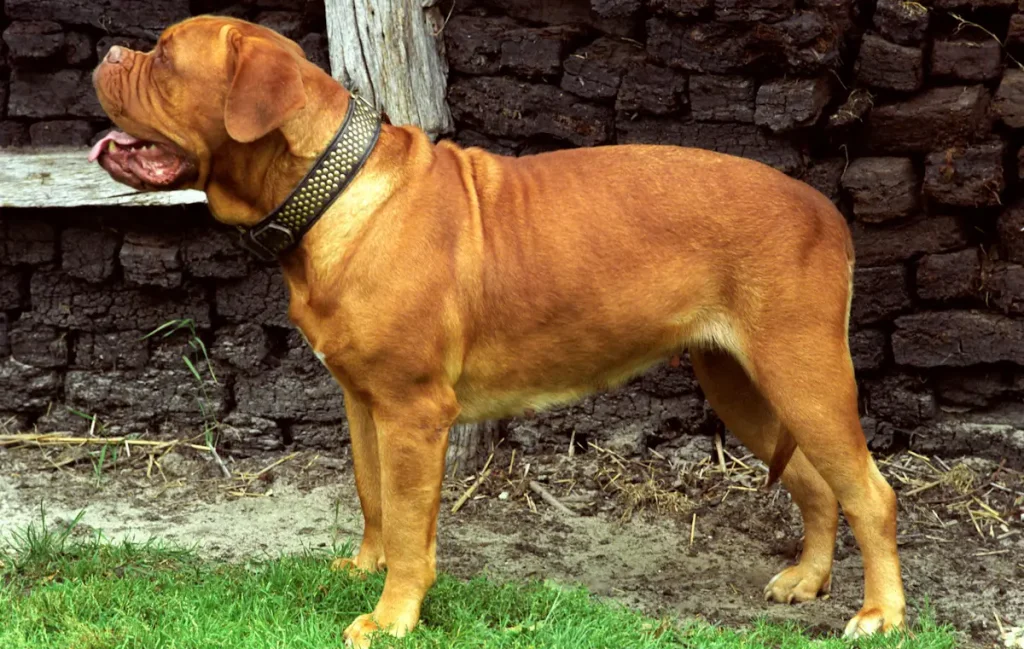Have you ever encountered a breed as imposing yet gentle as the Dogue De Bordeaux? You’re likely aware of their massive stature and distinctive reddish-brown coat, but there’s more to these French Mastiffs than meets the eye. As you consider adding one to your family, it’s crucial to understand their unique characteristics, from their protective instincts to their surprisingly tender nature.
They’re not just pets; they become an integral part of your home, demanding respect and care that align with their specific needs. While they may appear intimidating, their loyalty and affection are unmatched, and if you’re up for the challenge, you’ll find a depth to this breed that often goes unnoticed.
Stay with this conversation to uncover the layers of their temperament and learn how to cater to their well-being, ensuring a harmonious bond that lasts a lifetime.
- Noise Level
- Energy
- Sociability
- Trainability
- Care
- Health
Overall
Summary
Dogue De Bordeaux is a breed known for moderate noise levels, moderate energy, good sociability, moderate trainability, moderate care requirements, and generally good health.
Dogue De Bordeaux: Traits, Temperament, and Care Guide
The Dogue de Bordeaux is commanding with its muscular build, typically weighing between 99 and 150 pounds. It requires attentive care and socialization to ensure it remains a well-behaved and affectionate family member.
Your Dogue’s temperament thrives with rigorous training and exercise, mitigating health problems and honing protective instincts.
As family dogs, they demand a care guide that underscores consistency in grooming and diet for optimal wellbeing.
Exploring the Characteristics of the Dogue De Bordeaux
Delving into the characteristics of the Dogue de Bordeaux reveals a breed with a robust physique and a temperament that combines strength with tenderness, requiring owners to commit to structured training and socialization from an early age.
| Trait | Description | Relevance |
|---|---|---|
| Size | Massive head, skin folds | Intimidating yet noble appearance |
| Temperament | Gentle with children, strong temperament | Requires early socialization |
| Health | Prone to hip dysplasia, other issues | Needs regular veterinary care |
Dogue De Bordeaux: A Comprehensive Profile and Guide
You’re about to gain a thorough understanding of the Dogue de Bordeaux, a breed distinguished by its imposing stature and a weight range of 99-150 pounds.
Their short and dense coats require regular grooming to maintain their condition, and their fawn shades necessitate specific care to preserve the coat’s quality.
With their health predispositions, including hip dysplasia and heart conditions, it’s imperative to incorporate moderate exercise, a balanced diet, and regular veterinary screenings into their routine.
Everything You Need to Know
Embark on your journey with the Dogue de Bordeaux, a breed whose imposing stature belies its gentle temperament. Discover the nuances of responsible ownership, from health care to training techniques.
- Health Care: This breed is prone to certain ailments and requires regular vet check-ups to monitor for hip dysplasia, heart issues, and joint health.
- Dog Training: Employ consistent, positive reinforcement to align with the National Kennel Club standards.
- Family Integration: Supervise interactions with children, fostering a sense of belonging within the family unit.
Discovering the Temperament
When exploring the temperament of the Dogue de Bordeaux, it’s essential to recognize their calm and gentle nature, particularly in the presence of strangers. They’re loyal and protective toward family members, valuing belonging.
Despite a high prey drive, they can learn to tolerate another dog with consistent training and socialization. It’s a good idea to start socialization early to nurture their affectionate disposition and mitigate potential aggression.

Dogue De Bordeaux: Is It a Good Fit for Families?
Given their reputation for loyalty and affection, you may consider a Dogue de Bordeaux as your family pet.
It’s important to understand that while they can be gentle giants with family members, their substantial size and protective nature necessitate careful supervision around small children.
Consistent training and socialization from a young age is crucial to ensure they develop into well-behaved family companions.
Assessing Dogue De Bordeaux’s Compatibility with Families and Kids
The Dogue de Bordeaux exhibits a gentle disposition toward children, yet close supervision is crucial to safeguard the dog and young family members during interactions.
Training this dog breed, whether a puppy or adult dog, involves consistent socialization to nurture their patient and calm nature.
Ensure their playful behavior with children is monitored to prevent accidental harm due to their size.
Dogue de Bordeaux’s strong family attachments make them good with families, fostering a sense of belonging.
Adjusting to New Environments
Introducing your Dogue de Bordeaux to a new environment requires a gradual approach and steady patience to ensure their comfort and ease during the transition.
Employ positive reinforcement as your Dogue de Bordeaux dogs adjust, maintaining consistency with routines and familiar items.
Supervise interactions in new environments, providing mental and physical stimulation to alleviate stress.
The de Bordeaux is gentle, and they’ll adapt successfully with careful guidance.
Obedience Essentials for Bordeaux
You must employ effective training strategies for your Dogue de Bordeaux to ensure they respond well to commands.
This involves consistent positive reinforcement, clear boundaries, and patience, given their strong-willed temperament.
Start training sessions early to establish good behavior patterns and prevent dominance issues.
Effective Training Strategies for Dogue De Bordeaux
Establishing a foundation of obedience in your Dogue de Bordeaux hinges on early socialization paired with consistent, positive reinforcement techniques to harness their protective instincts.
| Aspect | Strategy | Benefit |
|---|---|---|
| Socialization | Introduce to various stimuli | Prevents overprotectiveness |
| Positive Reinforcement | Reward good behavior | Encourages obedience |
| Consistency | Regular training sessions | Ensures command retention |
| Exercise Needs | Daily walks, play | Balances energy levels |
| Mental Stimulation | Puzzle toys, commands | Reduces boredom, sharpens mind |
Exercise and Grooming Needs
Dogue de Bordeaux dogs require a balanced routine of physical activity and mental engagement to maintain their well-being. This should be coupled with straightforward grooming practices, including regular brushing and attentive care of their distinctive skin folds.
Ensure these dogs get the right exercise, such as a long walk, to prevent weight gain and mitigate potential health issues. Dogue de Bordeaux dogs are prone to heart problems, so consistent exercise and grooming are critical for their overall health.
Additionally, it is important to note that these dogs are highly effective guard dogs. Therefore, their coat care should not be neglected. Regular grooming and attentive care are necessary to keep their coat in good condition.

Health Considerations
As you familiarize yourself with the Dogue de Bordeaux, it’s crucial to acknowledge their susceptibility to certain health issues. These include hip and elbow dysplasia, cardiac problems, and bloat. To ensure the well-being of your Dogue de Bordeaux, you’ll need to commit to regular vet check-ups and health screenings. This will help catch and manage these conditions early on.
In addition to regular check-ups, proactive health management and a well-maintained diet can also influence their lifespan. However, it is possible to extend their lifespan with proper care and attention to their health.
Common Health Issues and Lifespan
When considering the health of a Dogue de Bordeaux, it’s important to note that this breed typically lives for 5 to 8 years. They are predisposed to conditions such as hip dysplasia, heart problems, and bloat. Regular health screenings can detect certain health issues early.
As members of the American Kennel Club, your Dogue de Bordeaux’s well-being is paramount. It affects their quality of life and lifespan.
Dogue de Bordeaux: The Gentle Giant of the Canine World
Delve into the world of the Dogue de Bordeaux, a massive and powerful breed with a heart of gold, perfect for those who love gentle giants.
| A noble breed, known for its large size and gentle personality, is often called a gentle giant. | Short Description |
|---|---|
| Mastiff | One of the largest breeds, known for its impressive size and gentle demeanor. |
| Neapolitan Mastiff | A breed famous for its loose skin and wrinkles, combining strength with a laid-back attitude. |
| Great Dane | A noble breed, known for its large size and gentle personality, often referred to as a gentle giant. |
| Bullmastiff | A solid, powerful dog, known for its protective instincts and family loyalty. |
| Saint Bernard | A large working dog, famous for its rescue instincts and gentle, loving nature. |
Is Dogue De Bordeaux the Right Pet for You?
Determining whether a Dogue de Bordeaux aligns with your lifestyle and home environment is crucial, considering their specific socialization, training, and health care needs.
If you’re considering getting a Dogue, assess if your space accommodates this large breed. Bordeaux Mastiffs aren’t typical apartment dogs; they need enough exercise and shouldn’t be left alone with smaller animals.
Meticulous attention to their diet, amount of food, and potential health problems is imperative.
Conclusion
In the tapestry of canine companions, the Dogue de Bordeaux stands as a steadfast guardian, embodying strength and tenderness. Like a seasoned knight loyal to their kin, this breed requires a shield of proper care—vigilant health monitoring, consistent training, and grooming.
Embrace this noble hound’s journey, for in the interwoven threads of your lives, you’ll find a deep bond fortified by love and mutual respect. Choose wisely, for this is a partnership of profound commitment.
Frequently Asked Questions
What Are the Characteristics of a Dogue De Bordeaux?
You’re considering a Dogue de Bordeaux, known for its strong build, large head, and wrinkled face. These gentle giants with a protective nature sport a short coat and a deep bark; expect heavy drool.
What Is the Difference Between a French Mastiff and a Dogue De Bordeaux?
You might think they’re the same, but the French Mastiff and Dogue de Bordeaux differ in breed origins, size, and coat. Let’s dissect their unique traits and shatter any temperament misconceptions.
What Is the Demeanor of a French Mastiff?
You’ll find a French Mastiff’s demeanor to blend gentle giants’ calm temperament and protective instinct, paired with affectionate behavior, making them loyal companions with a family-oriented nature, although early socialization is key.
What Is the Characteristic of Mastiff?
As the saying goes, “size isn’t everything,” but mastiffs’ large size, protective instincts, and gentle nature make them loyal companions. They have notable health concerns and training challenges, requiring consistent socialization and moderate exercise.
